-
What does it mean to be a Marxist?
What’s in a name? Being a Marxist means being a revolutionary anticapitalist, a fighter against all forms of oppression, an internationalist who wants to end capitalism around the whole world, and a believer in the power of the working class.
-
The “spectre of communism” haunts the world: 172 years of the Communist Manifesto
Tens of thousands of people in Asia, Africa, Latin America and North America publicly read the Communist Manifesto to commemorate the 172nd year since its first publication in 1848.
-
Why didn’t Marx finish Capital?
The question why Marx’s Capital remained unfinished has occupied many for more than a century.
-
New starting point(s): Marx, technological revolutions and changes in the centre-periphery divide
This paper presents the last book that Marx excerpted in his life: La Physique Moderne, written by Hospitalier and published in 1882. This last Notebook (B156, in the IISG’s archives) contains hints of other issues that he was researching in his last years, especially societies at the periphery.
-
Shakespeare’s Tempest and Capitalism: The Storm of History
As well as being significant in terms of Shakespeare’ s own aesthetic output, The Tempest provides a vivid window into the tumultuous historical currents and contradictions of the epoch in which the great playwright lived, syphoning them into its ethereal and haunting poetry. Helen C. Scott’s excellent and timely study of the play is a book of two parts
-
1131: Capitalism and ecological theft
Sociologist John Bellamy Foster on the modern divide between humanity and nature and his book “The Robbery of Nature: Capitalism and the Ecological Rift” from Monthly Review.
-
You write injustice on the Earth; we will write revolution in the skies
‘Scientists are wrong’, the Uruguayan writer Eduardo Galeano said with a warm smile on his face. ‘Human beings are not made of atoms; they are made of stories’. It is why we want to sing and draw, tell each other about our lives and our hopes, talk about the wonders in our lives and the wonders that we dream about. These dreams–this art–are what make us get up each day, smile, and go forward into the world.
-
No excuses–we have to shut down the fossil fuel industry
In the face of an ecological catastrophe as enormous and terrifying as this season’s bushfires, you might think that policy might begin to shift, as those in power face up to the reality of human-induced climate change. But you’d be wrong.
-
Capitalism, socialism and over-production crises
Unlike capitalism, socialism avoids any waste or slack, such as is caused by an over-production crisis, by raising the consumption of workers appropriately to avert it.
-
Isabelle Garo on Marx’s strategic thought and the spirit of revolt
The present context in France and across the world is quite bad for the exploited and oppressed in general, as also for the organised workers’ movement. This long term weakening in the conditions of capitalist crises gave the green light to the ruling classes to take out their revenge at the end of the 1970s and wind back the limited but real social gains of the post-war period.
-
The climate and the fat tail risk
My gap year ends in August, but it doesn’t take a college degree in economics to realise that our remaining 1,5° carbon budget and ongoing fossil fuel subsidies and investments don’t add up.
-
Marxism and the Climate Crisis: African Eco-Socialist Alternatives
There is a rich inheritance of emancipatory Marxism in Africa, which includes Frantz Fanon, Ruth First, Samir Amin, Sam Moyo, Harold Wolpe and many others. Today, Satgar argues, the challenge is to defeat carbon capitalism accelerating the climate crisis and fomenting exclusionary nationalisms and for this there has to be a return to Marx.
-
Rosa Luxemburg and debt as an imperialist instrument
In her book titled The Accumulation of Capital, published in 1913, Rosa Luxemburg devoted an entire chapter to international loans in order to show how the great capitalist powers of the time used the credits granted by their bankers to the countries of the periphery to exercise economic, military and political domination on the latter.
-
Climate Change and Rebellion: an interview with John Molyneux
In an interview with the socialist writer and activist, John Molyneux, ROAPE’s Leo Zeilig asks him about climate change, capitalism and socialist transformation. In an important initiative John has recently founded the Global Ecosocialist Network (GEN) which brings together activists and researchers from across the Global North and South.
-
Blue Acceleration: Capitalism’s growing assault on the oceans
“A new phase in humanity’s relationship with the biosphere, where the ocean is not only crucial but is being fundamentally changed”
-
A possible Communist redefinition of love
In In Praise of Love, Alain Badiou defined love as a form of “minimal communism [where] the real subject of a love is the becoming of the couple and not the mere satisfaction of the individuals that are its component parts.”(1) Earlier in the book, Badiou provided a more elegant statement, associating the act of loving to “learn[ing] that you can experience the world on the basis of difference and not only in terms of identity.”
-
The marginalization of Marxism in academia
There is a difference between some amount of salt and zero amount of salt. There is a difference between a limited amount of salt and a significant amount of salt. When the amount/quantity of a thing gets reduced below a level or when it is increased above a level, then that thing itself does not exist or almost ceases to exist (it loses its essence). Instead of salt, think Marxism.
-
The war in Libya will never end
General Khalifa Haftar and his Libyan National Army (LNA) continue to partly encircle Libya’s capital, Tripoli. Not only does the LNA threaten Tripoli, but it is within striking distance of Libya’s third-largest city, Misrata.
-
Welcome to Global Ecosocialist Network
The Global Ecosocialist Network (GEN) is being launched at a moment of extreme danger for humanity. The intensity of the crisis and the scale of the danger is hard to grasp or express adequately because, unless you are in one of the parts of the world currently experiencing extreme weather, it cannot yet literally be seen. And even where the danger is actually being experienced there are very powerful forces at work to obscure its real causes.
-
Climate journalism and fossil fuel ads: an unholy marriage?
NBC’s Camel News Caravan was one of the earliest television news programs in the United States. Sponsored by Camel Cigarettes, the program had an anchorman who not only kept an ashtray on his desk and often smoked while delivering the news, but also encouraged viewers to light up a Camel.




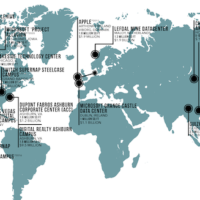

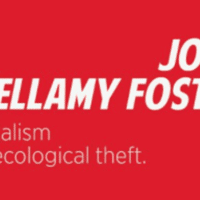

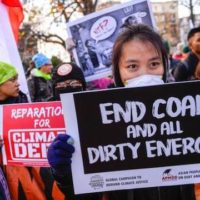
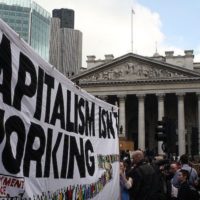


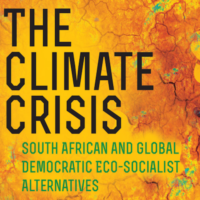




![There are several aspects of dialectical thinking. One is totality: different ‘things’ and different relations and processes inter-connect to produce a whole, a totality. The totality shapes the parts that make the totality. Bukharin, among others, emphasized this idea. Another aspect of dialectical thinking is the idea of conflict/contradiction or the inter-penetration of opposites. Lenin stressed this idea. The third is the law of the transformation of quantity into quality and vice versa, an idea that Trotsky regularly underlined.[i] Let us consider the third aspect of dialectical thinking. There is a difference between some amount of salt and zero amount of salt. There is a difference between a limited amount of salt and a significant amount of salt. When the amount/quantity of a thing gets reduced below a level or when it is increased above a level, then that thing itself does not exist or almost ceases to exist (it loses its essence[ii]). For example, when the temperature of water is so low that it is below zero, it is not water anymore. And when it is above 100 degrees, it is not water either. Instead of salt, think Marxism. Marxism’s marginal position in academia[iii] What appears to be a choice in capitalism is the opposite of choice – i.e. the lack of choice. Capitalism reproduces itself through this ‘inter-penetration of opposites’: what is actually true and what is imagined to be true are mutual opposites. Nearly all varieties of toothpaste, like the different bourgeois parties such as Congress or the BJP, or the Democratic Party and the Republicans, are, more or less, the same, but they are generally seen as significantly different. Of course, there is a difference. But the amount of difference between the different dominant parties is insignificant, more or less, as far as the objective interests and rights of the majority of people are concerned.[iv] As is in the market for commodities and in the political world (electoral market), so it is in the cultural sphere. In academia as a part of the cultural world, various things, various methods of looking at the world, are offered by professors. Students, and indeed people in the wider society, are free to choose whichever way of thinking appeals to them the best, or whichever way of thinking appeals to their class interest and their already-existing interpretations of their class interest the best. In presenting ideas in their lectures, academic writings and media interventions, etc., academic people try to give the appearance that students and society are offered different viewpoints and that the academics are balanced and impartial. But, in fact, in the name of well-advertised academic choice in the academic marketplace, and indeed, in spite of the formal commitment to the principle of academic freedom, the academic system provides little choice. The academic system either reduces the curricular content of Marxism to zero or to an insignificant amount (as in some of the progressive places) such that it is as good as zero. Of course, there is choice. The choice is limited to mainstream – bourgeois – ways of thinking about the world. This is akin to the fact that workers have a choice in the labor market: they can choose to work for this capitalist or that capitalist. But they cannot choose not to work for a capitalist at all. Similarly, students can choose to take this course or that course, all of which, more or less, are within the mainstream framework, but they are not free not to choose any of these. They are not free to choose Marxist education. This is simply because there is none or little of it in the academic market. It is not true that the academic world entirely neglects Marxism. Some academics do occasionally give a quote from Marx or a Marxist or cite a Marxist writer in their paper or ask their students to read a Marxist article in a course. They do this while remaining firmly inside the mainstream mode of thinking. As well, some academic people try to associate themselves with Marxism[v] by presenting some criticisms against neoliberalism or against excesses committed by capitalism (e.g. too much poverty, too much ecological change, too much inequality, too much corruption, too much curtailment of democratic rights, etc.). They, however, show their ignorance about the following Marxist view: there is a distinction between form and content and between fundamental mechanisms and the concrete outcomes of those mechanisms, and that the criticisms of the form (e.g. neoliberalism or globalization) and of concrete outcomes (e.g. excesses) are not the same as the criticisms of the class content of capitalism itself or the fundamental class-mechanisms. So, when some academic men and women, of different racial and ethnic backgrounds, try to show that they have something to do with Marxism, one must note that this something is so little that it is almost non-existent. The Marxist view, on the other hand, includes the critical analysis of both content and form, and of both the mechanisms and the concrete outcomes. The Marxist view is powerful because it says: that an adequate understanding of society and its metabolic relation with nature requires a commitment to materialist-dialectical thinking; that humanity’s problems — social-ecological crisis, uneven geographical development, economic inequality and crisis-ridden instability, etc. — are rooted in relations of class power and capitalism; that the actual functioning of class exploitation and capitalism shapes, and is shaped by, social relations of oppression such as those based on gender, race, caste, religion, language, sexual orientation, indigeneity, and nationality, all of which enormously impact human lives within the overall framework of the existing class society; that the problems that capitalist class relations create cannot be resolved in any genuine and long-term manner by the capitalist state or any other agency inside capitalism; that the resolution of the humanity’s problems requires democratically-organized self-emancipatory struggles of workers and small-scale producers of different social backgrounds; that the struggle for a new society must be a struggle for the (defense of) general democratic rights (including the right to free speech and assembly and the right to dissent) and for specific democratic rights of — protections for — the socially oppressed groups (such as women and racialized and indigenous peoples), and economic-ecological concessions from the exploiting property-owning classes and their state, as a part of the fight to abolish class relations and capitalism; and that in place of existing class relations and capitalism, there is an urgent need to put in place a multi-scalar, and ultimately, global, social order in which society’s natural and produced resources will be under democratic control of the masses for the direct (i.e. non-market) satisfaction of their material and cultural needs in a manner that is egalitarian, ecologically sustainable and democratic. And that is why Marxism is so much more powerful than typical academic views. It should be noted that when Marxism does find some space in academia, including in the curriculum and academic research, it is treated in a de-politicized way. I sometimes hear things like, ‘I like that idea from Marx but this Lenin is too much’. Even Marx, the co-founder with Engels, of scientific world-socialism, himself is depoliticized. Many academics believe in the need for the separation between ideas and views of what is to be done to change the world, or ideas and ethical values. This supposed separation is a trait of some parts of bourgeois thinking (e.g. positivism and positivism-inspired analysis) and is rightly criticized by some progressive academics. But when it comes to Marxism, such a critique itself is critiqued thus nullifying the valid idea that explanatory views and visions for change are mutually connected in some ways, however irreducibly (See Das, 2019). For progressives, Marxism can only be talked about in terms of what it says about the world, but the Marxist vision for changing the world is too dangerous. And if Marxist politics is ever talked about in academia, the outer limit is, usually, social democracy type thinking: the idea that the world can be a better place on the basis of some government intervention, trade union (type) struggle and social movements against inequalities and ecological damage. Their underlying explanatory view of the world is: the world’s problems exist because of a lack of good government policies and adequate amount of human agency and good thinking. It is forgotten that social democracy, whether of the old or new type, is the bourgeois politics of the working class. How is Marxism marginalized? The story of qualified Marxists not being offered academic jobs and of them being denied tenure and promotion, of Marxist articles rejected on political ground, and so on, is a familiar one. I want to briefly mention the ‘micro-politics of anti-Marxism’ inside academia (See Das, 2013). What academia does to Marxism can be seen in how Marxism is dealt with in the large number of elective courses (optional courses) and in the limited number of mandatory courses offered in different academic units in universities. The mandatory courses are the ones that all students in a given cohort are expected to take in order to be initiated to a given discipline or sub-discipline, and are therefore pedagogically very important. Gate-keeping — control over what gets taught — is crucial here therefore. In a university mandatory course on methods or the history of a discipline, little on Marxism is introduced to students, while most of the time is spent on the different non-Marxist modes of (critical) theory and (critical) thinking. The course outline for a methods course will contain little or nothing on Marxist dialectics, materialism, epistemology, etc. Marxism is treated, if at all, as merely one of several things, and a minor one, in a mandatory course. Of course, in an academic world, where many people believe that a given thing cannot be seen as more important than another thing, what reason can there be to give a lot of stress on Marxism? But that same view about non-primacy (the idea that nothing is more important than anything) does not stop the instructor from spending most of the time on the different ways of knowing, all of which are, more or less, mainstream (they reject the existence of objective processes, they reject or say nothing about dialectics or the material character of the world, they say little about the relation between knowledge and material class interests, and so on). One week on Marxism in a long semester of 13 or 15 weeks is generally too much. And when Marxism is dealt with, it is usually dealt with in a very superficial, partial and distorted manner. This is in part because: the teachers who teach these courses, as nearly all the teachers in a university, have very little interest or expertise in Marxism. What I say about the academic curriculum applies very well to three other academic areas. One is the academic conferences: these are cash-producing machines where various bourgeois ideas are peddled freely and unabashedly in the name of intellectual discussions. This is indicated by the fact that if one visits the websites of discipline-based academic conferences to search for such words as Marxist/Marxism, one will find very few papers and sessions that deal with Marxism. The second is the world of academic journals (the production of which is big business). Marxist authors are rejected by the reviewers and editors or asked to make revisions that will take most of the Marxist content out of the Marxist contributions. All this is done on political ground, more or less, although the action is justified on intellectual grounds. Most of the articles that are published in academic journals have little to do with Marxism, while publications in academic journals are considered to be an important marker of an academic. Consider the journal impact factors of major Marxist journals (usually below 1) relative to the journal impact factors of mainstream academic journals. If the editor of an academic journal acts too smart and independent-minded (i.e. becomes too much of a Marxist), it is not unusual for that editor to be shown the door: he/she is removed. Then there is the world of graduate research conducted by Masters and doctoral students under professorial supervision. A large number of research projects are about tiny little aspects of society in this or that geographical region of the world. Many projects are about how people mentally (and through localized individual actions) construct things and their identities, and even nature and their body. They say little about the society as a (contradiction-ridden and uneven) totality. They say little about society’s fundamental objective structures of economic and political power relations that exist independently of how people think at a given point in time. A large amount of graduate research that is intellectually interesting is usually conducted by students who are heavily, not marginally, influenced by Marxism. There are various time-tested mechanisms that are shrewdly and consciously used by the academia in its endeavor to marginalize Marxism. One is resorting to disciplinary thinking. Marxism does not accept boundaries among disciplines, although it can accept that every discipline can provide certain crucial insights into a specific problem (e.g. poverty, ecological damage).[vi] In an initiation course in a given discipline, by forcing students to read the work of scholars from that given discipline could have the objective effect of keeping Marxism out because the interesting Marxist work cannot be easily pigeonholed into Sociology or Economics or Human Geography.[vii] In the name of initiating students into a discipline, the professors keep Marxism away from students and students away from Marxism. Resorting to disciplinary chauvinism is thus one way of keeping Marxism away from students. There is another way: resorting to identity politics. While increasingly academic people have lost their relevance to the economic and political interests of the exploited masses and to oppressed nations of the world under imperialism, vast sections of the academic world have turned to identity politics often dressed up as social justice, critical thinking, etc.: in fact, the loss of relevance and resort to social-constructionist identity politics are often two sides of the same coin. One feeds into another. Basically, the outer limit of the social relevance of the academia is defined by the fact that they talk about inequality between men and women or between races or castes, as they are isolated from broader issues of national and international (or imperialist) political economy and political power rooted in the monopolistic control over productive resources in the hands of a tiny minority. According to the academics, the fundamental problems of society exist because of racial and gender or religious divisions (which could be changed merely through good government action and good use of human agency and progressive thinking). For a Marxist, world’s problems most definitely do not exist because of gender and racial divisions that identity politics focuses on, while Marxists do strongly agree that once a problem exists, some groups (e.g. Blacks or India’s ex-untouchables or Muslims) suffer from it more than others, and that therefore social oppression is very important. Often appearing to be progressive and egalitarian is an ideological cover of the academics, treated as conscience-keepers, and this is needed to cover their truly un-progressive character. The fact is that the academics cannot assume a truly progressive character unless they see the world from the standpoint of the interests of the toiling masses of different gender and ethnic and racial backgrounds. But the academics cannot see the world from the standpoint of the toiling masses, given their structurally-assigned role in a bourgeois society. This deficiency within the academic world cannot be really compensated for by its effort to resort to social-constructionist middle-class-based identity politics, although an attempt is constantly made. Students are constantly bombarded by the professors with the message about racial and gender inequality and similar processes, in the name of ‘critical this’ or ‘critical that’. The outer-limit of such critical enterprises is a slightly modified bourgeois society, where academics and people like them have a slightly better life. The so-called progressive academics can be critical of everything but capitalism’s fundamental class dimensions (i.e. combined and inter-locked relations of exchange, property, production and exploitation) (see Das, 2017: Chapter 6). Indeed, by engaging in identity politics, the academics really champion the interest of the petty-bourgeois people like themselves: they generally do not talk about women or oppressed races or oppressed castes from low-paid wage-earning class-stratum or non-exploiting small-scale-producers’ background. They champion identity politics to show their social relevance, to compensate for the fact that when it comes to the fundamental interests of the masses, their views are retrograde. While Marxists, including those few in the academia, champion the basic interests of the masses, by treating their interests as fundamentally irreconcilable with those of the ruling class, the typical academic people do not do so. They cannot have that agenda at all. The academic people champion identity politics to directly attack Marxism, often by falsely arguing that Marxism does not do what they do: champion the interests of the oppressed. Here also academia reveals its ignominious ignorance about Marxism. And when Marxists counter the un-Marxist views of academia, often identity politics is resorted to in order to counter the Marxist critic: when a Marxist launches difficult criticisms of a non-Marxist, then many would think that the Marxist is not being respectful of the person whom the Marxist critiques.[viii] The Marxist is not being collegial enough. The matter takes the form of identity politics when the Marxist criticism is aimed at a non-Marxist who happens to be a woman, or a member of an oppressed minority (e.g. a Black, a lower-caste person, an indigenous person, etc.). If employed consciously, this is a rather cheap tactic to hide one’s ignorance behind identity politics, and also behind the principle of collegiality. This is a cheap tactic to hide one’s failure to answer Marxist criticisms. A Marxist asking difficult questions disturbs the normal academic order: there is plenty of disagreement among the academia, but all this happens within the limits of the walls of bourgeois and petty-bourgeois thinking according to which class relations and associated power relations are not the most fundamental cause of society’s problems. So anything that raises the class issue in a fundamental manner is very disturbing. And anyone that philosophically stresses the importance of dialectics, materialism and totality, is frowned upon, because these Marxist principles go against the view popular in academia that the world is basically made by ideas (social/mental construction) and/or small-scale actions, detached from objective structures rooted in class relations. Anyone who says that there is a gap between how things appear to be and how they actually are, is not appreciated. The academia operates within very narrow limits. Why is Marxism marginalized in academia? Capitalist societies, like all forms of class society, deploy consent-producing as well as coercive mechanisms of the capitalist class and its state apparatuses.[ix] Thanks to these mechanisms, many people have accepted capitalism and the capitalist way of thinking as the normal way.[x] If mechanisms producing consent to the system did not exist and if coercive mechanisms did not operate, then the capitalist system would produce its Marxist grave diggers in much greater quantity and much faster than is the case. But given these mechanisms which mean that capitalism is experienced as normal, some of the ways in which the academia marginalizes Marxism could be ‘unconscious’. The Marxist way just does not sound like a normal way of looking at the world, so why use it in the class-room or in research writings. And the marginalization of Marxism, in turn, contributes to academia and the common people seeing Marxism as not-normal. Everything that the academia does, every pore of their everyday life, is steeped with the fact that the Marxist way of thinking needs to be marginalized and excluded. This is the case even if almost all the non-Marxist academics will not acknowledge this fact. Like common people and most school teachers who teach young children about all the virtues of mainstream ways of seeing things and the virtues of the capitalist world, the academics believe that Marxism is utopian. Like the common people, the academics believe that people will always want to buy and sell things for profit, while Marxism is arguing against this, so Marxism is against human nature. Such a belief continues to exist even when Marxism teaches that our nature is always shaped by changes in the way we live our lives materially and how we engage with the world politically. The academics believe that Marxism promotes authoritarian politics and that a communist world is necessarily dictatorial and the capitalist world is necessarily democratic. This false belief that is disseminated in schools is entertained by the adult intelligent people in academia even when it is the case that Marxism envisions a society that is significantly more democratic than any form of democracy that the human society has ever experienced so far, whether in the world’s oldest democracies or the biggest. Academic people associate Marxism, and especially, the Marxism of the 20th century as developed in the Lenin legacy, with authoritarianism, even when in the bourgeois society of our times, the limited democracy that the super-rich had hitherto tolerated is being destroyed every day, thanks to the attack from the right-wing and fascistic forces, which incidentally play cultural politics or identity politics of this or that type (the identity politics of religion as in India, for example).[xi] Male and female professors of different races in the academia believe that Marxism talks about economic matters only and is therefore deficient. This belief is in sharp contrast to the fact that for Marxism the economic is a deeply social, and political, conflict-ridden, affair. Every argument, every single rationale, that is offered, covertly or overtly, directly or indirectly, to marginalize Marxism is completely baseless. These arguments can be made mainly because the capitalist world and its governments allow these anti-Marxist arguments to be made. The very livelihood and self-pretentious view of the academia as intelligent people whose knowledge is examined knowledge and not common sense, depends on their anti-Marxist thinking and practice. How often do we hear that a Marxist course is not being approved, a Marxist research project is not being funded, a Marxist argument by a student in the class-room is (covertly) mocked at, and so on? Professors definitely bring their commonsensical and pre-academic (under-examined) prejudices into the academia: from their childhood, they have been educated to support the fundamental traits of the current system (including in slightly modified forms) — private property, production for profit, people needing to work under the control of a boss, exclusive emphasis on elections as a way of changing things in society (even if in the so-called elections, voters’ decision is shaped by the power of money and media and by the lack of genuine choice on the ballot-box). And when they enter into the halls of the academia, they bring those prejudices and polish them, sugar-coat them and present them as lectures and supervisory advice. And students believe them. The academic world reflects the world of commodity production in an interesting way. In a given commodity-producing sector, some producers produce their commodity at value, others above value and still others below value. The producers who produce at value or below value (i.e. whose cost of production is average or below average) make a profit. Any producer who uses more than an average amount of socially necessary abstract labor embedded in living labor and machines, etc., is in trouble: they can go out of business. More importantly, Marxism is the most threatening — the most critical — way of looking at and changing the world. One the one hand, Marxism threatens the interests of the big business and big landlords and their subservient politicians and sycophantic intellectuals. On the other hand, Marxism represents the interests of the toiling masses. Marxism is not liked because it says that there is an irreconcilable antagonism between the fundamental interests of the masses and those of the top 1-10% (the large owners of property who live off profit, rent and interest). Striking permanent compromises and conciliation between the interests and views of the opposed classes and thus maintaining and disseminating a balanced view about things, is a fundamental trait of an academic and of academic acceptability. After all, the academia, especially those with tenure and good salary and benefits, possess some traits of the petty-bourgeois class position which is between the bourgeoisie and the toiling masses. Marxism beyond academia: Can the educators be educated? The academic world which is believed to be made up of intellectually strong people refuses to believe that in terms of examining the society and its interaction with the physical world, the most important difference is between Marxism and the rest, and that this difference reflects, more or less, the most important division in the world (the division between the two major classes) that feeds into, and that is reproduced on the ground, by racial, gender and other similar divisions. Those few who are Marxists are on one side and the rest on the other. To recognize that difference will, however, reveal the intellectual weakness of the large sections of the academia. It will also reveal the fact that from the standpoint of the toiling masses, they are politically bankrupt. I am not at all suggesting that only Marxists are intelligent people or that if one sees things from the standpoint of the masses, one automatically produces great insights. Indeed, bourgeois intellectuals produced great insights that Marxism appropriated, but that happened during the time when the bourgeois mode of production and exchange was progressive and not in decline. Bourgeois intellectuals fought against feudalism, against obscurantism. They were progressive relative to what occurred in pre-bourgeois society. To think that academia could be a significant site of Marxist thought in the capitalist world is an un-Marxist illusion. The ideas of the ruling class are indeed the ideas that seek to rule our lives, as Marx and Engels claimed, even if these ideas do not go uncontested.[xii] The fundamental goal of academia is to reproduce the cultural-political (and technical) conditions for capitalist society including imperialism. And as a part of fulfilling this goal, academia must counter and marginalize Marxism, ‘which directly serves to enlighten and organize the advanced class in modern society, indicates the tasks facing this class’ (Lenin, 1908). It is clear that academia cannot really be a serious and genuine site for the development and defense of Marxist thought, even if it is the case that there are a few Marxists in the academia who work under very difficult conditions (See Das, 2019). The genuine sites of Marxism are, and must be, outside of the academia. These are the sites of economic, political and cultural struggle from below: working class reading groups, factory committees, trade unions, anti-oppression struggles, peasantry’s ecological movements, political parties and tendencies, inter-disciplinary Marxist journals (online and in-print), Marxist conferences, Marxist summer schools, and so on. There isn’t, and there will not be, any other single body of thinking that can even remotely compete with Marxism in terms of the explanatory power or the political vision for producing a qualitatively better society. The society that Marxism intellectually and politically fights for is a society that is democratic, that meets the material and cultural needs of all men, women and children, that is ecologically sustainable, that has zero tolerance for oppression of women and of minorities whether it is based on race, caste, sexual orientation, etc., and that promotes solidarity among the toiling masses and nations of the world. Marxism fights for a society where our thinking is based on reason and evidence. Marxism fights against both fascistic fantasies and idealistic social constructionism (the latter two are not un-connected). The educators need to be educated. But it is futile to expect that the educators in academia can be educated in Marxism. To expect that they can be educated in Marxism and then educate students and the public in Marxism, is to believe that the academic educators can relinquish their true cultural-political role assigned to them by the class-society. A few among them can. This is akin to a few bourgeois or landlord people joining the masses in their fight against exploitation. But a class cannot commit suicide. The academia as a petty-bourgeois class (or a class stratum) cannot commit suicide. It cannot abdicate its structural role. It cannot go against its own overall interest. But it can certainly continue to hide its true colors. It can continue to ‘cheat’ students and the wider society. The academic people involved in social sciences and humanities hide their true colors (their bourgeois colors) and marginalize Marxism in many concrete ways.[xiii] The academic world uses various strategies, including identity politics to suppress, marginalize and exclude Marxism. It is doing what it is doing mainly because of its class-determined role to help reproduce the existing class society. There is something that is happening now that can impact academia: anti-capitalism is growing in the wider society. In the US, where socialism/communism is a taboo, according to a Pew Research Center poll in June 2019, 42 percent of Americans have a positive view of socialism, while 33 percent were either somewhat or very negative about capitalism. Of the roughly 4 in 10 Americans with favorable opinions of socialism, about a third said ‘it will result in fairer, more generous society’. Of those who reported a negative view of capitalism, 20 percent argued that it is exploitative or corrupt, while 23 percent pointed to unequal distribution of wealth (Wolfe, 2019). The younger generation in the US is becoming skeptical of capitalism. The vast majority of this generation is for some form of socialism. In November 2017, a poll conducted by YouGov showed that 51 percent of Americans between the ages of 21 and 29 would prefer to live in a socialist or communist country than in a capitalist country (Grey, 2018). Now, this growing anti-capitalist mood could have a double impact on the academia. It could make small sections of academia move in the Marxist direction. It could make vast sections of academia, like the bourgeoisie and state itself, orient more towards identity politics, which is dressed up as progressive politics. It is the latter trend that is going to be the dominant trend in academia as far as its relation to Marxism is concerned. This is a part of bourgeois reaction in the contemporary world. The history of academia is the history of suppressing Marxist thought, and Marxism itself provides the reason why that is, and why that must be, the case. And, the history of Marxism must include the history of the struggle against bourgeois thinking and practice within the academia. But the real struggle is neither within the academia nor is it against the academia. It is elsewhere. Raju J Das is based at York University, Toronto and can be reached at rajudas@yorku.ca References Das, R. 2013. ‘The Relevance of Marxist Academics,’ Class, Race and Corporate Power: Vol. 1: Iss. 1, Article 11. DOI: 10.25148/CRCP.1.1.16092150 Available at: https://digitalcommons.fiu.edu/classracecorporatepower/vol1/iss1/11 Das, R. 2017. Marxist class theory for a skeptical world, Brill: Leiden. (The paperback edition of the book is published in 2018 by Haymarket, Chicago). Das, R. 2019. ‘Revolutionary theory, academia and Marxist political parties’, Links: International Journal of Socialist Renewal, http://links.org.au/revolutionary-theory-academia-marxist-political-parties Grey, B. 2018. ‘The specter of Marx haunts the American ruling class., WSWS, https://www.wsws.org/en/articles/2018/11/06/pers-n06.html Lenin, V. 1908. Marxism and Revisionism. https://www.marxists.org/archive/lenin/works/1908/apr/03.htm Marx, K. and Engels, F. 1845. The German Ideology. https://www.marxists.org/archive/marx/works/1845/german-ideology/ch01b.htm Wolfe, L. 2019. ‘New Poll Asks Why People Support Socialism and Capitalism’, Reason, https://reason.com/2019/10/11/new-poll-asks-why-people-support-socialism-and-capitalism/ [i] All these ideas are briefly discussed in Chapter 5 of Das (2017). [ii] The essence — or, a set of essential traits — of an object defines what it is and differentiates that object from other objects. A class society has an essence that distinguishes it from non-class societies, and a capitalist society has an essence that distinguishes it from non-capitalist society (Das, 2017). A hallmark of a lot of academic thinking now-a-days is that there is no such thing as essence. [iii] I focus on the social sciences and humanities part of the academic world. [iv] This comment has to be seen in the context of Marx’s point in German Ideology: all struggles ‘within the state, the struggle between democratic, aristocratic and monarchy, the struggle for the franchise etc., etc. are merely the illusory forms in which the real struggles of the different classes are fought out among one another’. [v] Whether or not people would openly say this, Marxism is associated with rigor and therefore, with a certain amount of prestige. It talks about serious issues in a serious way, so it is different from other ways of seeing the world. Many of my own graduate students when they recall their pre-Marxist days say this. [vi] For example, the idea that things happen differently in different places, or that there is a friction of distance and that therefore distance matters to human social relations, is an important idea stressed in the discipline of Geography. But this idea is abstracted from the capitalist character of society within which the friction of distance operates. [vii] This is why sometimes a distinction is made between Marxism and, say, Sociology. [viii] Let us say that a brown man argues that Anthropology or Geography has had nothing to do with imperialism in the past, that the main focus of all academic disciplines has been to argue for a society where resources are democratically controlled by working men and women to meet everyone’s needs and that the most fundamental form of inequality is between races and between men and women. Let us say that a white woman criticizes these views forcefully and passionately. Then the brown man could say that the criticism is necessarily aimed at him being a brown academic, that the white woman (the critic) is necessarily racist. Saying this would be resorting to identity politics. It is a cover for holding reactionary views. [ix] By coercive mechanisms, I refer to the administrative ways in which Marxists are excluded from being a part of the academia, and I also refer to the fact of violent suppression of Marxists when they express their ideas and act in accordance with those views. [x] This is actually changing: large numbers of younger people have begun to prefer some version of non-capitalism (socialism) to existing forms of capitalism (I return to this later). [xi] To the extent that JNU in India has stood for some Marxist education, in the light of recent attacks from the right-wing movement on its students and teachers for exercising their democratic rights, it is clear to see which side is really authoritarian. [xii] ‘The ideas of the ruling class are in every epoch the ruling ideas, i.e. the class which is the ruling material force of society, is at the same time its ruling intellectual force. The class which has the means of material production at its disposal, has control at the same time over the means of mental production, so that thereby, generally speaking, the ideas of those who lack the means of mental production are subject to it. The ruling ideas are nothing more than the ideal expression of the dominant material relationships, the dominant material relationships grasped as ideas’ (Marx and Engels, 1845). [xiii] I am abstracting from the fact that: A section of the academic world is keen on imparting to students what are merely technical skills (e.g. GIS, computing, quantitative techniques, survey methods, etc.), believing that lack of technology and technical skills is the cause of society’s problems. There is nothing wrong with this approach as long as students are taught to think about the social and political origins and aspects of techniques and as long as they learn that there are limits to the extent to which mere knowledge of technique can address society’s problems.](https://mronline.org/wp-content/uploads/2020/02/The-marginalization-of-Marxism-in-academia-200x200.jpg)


